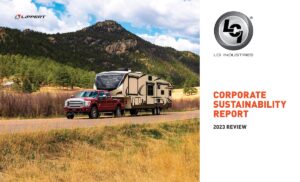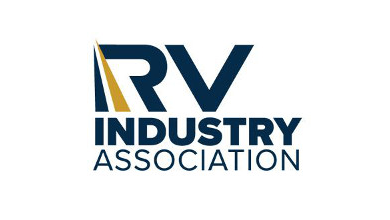How Lippert Keeps Tabs on Its Environmental Impact
Director of Sustainability Kartik Mekala explains the standards the company holds and why being a “responsible corporate citizen” matters.

“Business as a Force for Good.”
This motto has been embraced by Lippert across the globe and is especially meaningful for the company’s sustainability journey.
“What we are trying to convey is how our sustainability story is already deeply embedded in the initiatives we care about,” says Lippert’s Director of Sustainability Kartik Mekala. “We previously may not have seen the connection to sustainability. However, with my role, I’m helping the company see and understand how sustainability is already integrated into team members’ day-to-day jobs. We’re also developing initiatives to help team members understand and connect the dots.”
When Lippert was started in 1956, the company had a mission to be a “responsible corporate citizen.” RV PRO spoke with Mekala in February after he returned home to Michigan from the Greenbiz conference in Phoenix, and found this mission is still at the center of the company’s goals.

Focusing on areas that encompass ESG (Environmental, Social and Governance), Lippert and many companies around the world use these three touchpoints to measure the company’s impact.
According to Lippert’s website, those three touchpoints are defined as:
- Environmental – The company is acting “to understand, manage, and mitigate our environmental impact across value chains.” Lippert says they are committed to optimizing energy consumption, water usage and waste generation.
- Social – Lippert says it provides “resources necessary to support our team members’ holistic well-being, empowering them to be the best versions of themselves, at home, at work and in the communities in which they serve.”
- Governance – The company has taken “a collective-impact approach to fostering shared value generation,” including updating policies, increasing diversity on the board of directors and the addition of board oversight of sustainability.
These guidelines, as well as others the company follows that are in alignment with global standards, such as the Global Reporting Initiative (GRI), Sustainability Accounting Standards Board (SASB) and the United Nations Sustainable Development Goals (UNSDG), help the company prioritize its efforts.
“Our main focus is … [to] keep the company compliant with all sustainability/ESG-requirements here in the U.S. or in countries where we operate outside of the U.S.,” Mekala says. “For example, within the EU, there are regulatory requirements associated with [the] Corporate Sustainability Reporting Directive, which requires certain U.S. companies to provide ESG relevant data.”
Mekala says as new directives and information emerge from the administration, they are reviewing them carefully.
“We anticipate changes to sustainability and ESG topics, and we are closely monitoring what those mean to Lippert [and] the RV industry,” Mekala says. “We constantly look for reports from the industry association on government affairs and monitor tariffs on raw materials and how that is connected to ESG. Specifically, how those changes present as risks or potential opportunities to the company.”
 Monitoring and reporting on these efforts is now part of Lippert’s annual reporting process, with the 2023 Corporate Sustainability Report as the most recent example (the 2024 report was underway when RV PRO spoke with Mekala in February).
Monitoring and reporting on these efforts is now part of Lippert’s annual reporting process, with the 2023 Corporate Sustainability Report as the most recent example (the 2024 report was underway when RV PRO spoke with Mekala in February).
Mekala says this report is an important part of how they communicate to the company’s stakeholders — suppliers, customers and others — how Lippert is performing along its sustainability journey and striving to monitor, mitigate and manage its sustainability-related risks.
“It’s not merely a necessity; we believe it’s a crucial aspect of maintaining trust with our stakeholders,” the report states. The company aims “to achieve environmental stewardship, drive product innovation and enhance our human capital practices.”
Highlights From the 2023 Sustainability Report
- Natural resource consumption and waste monitoring took place at applicable facilities.
- A Culture Index Score was established to measure the impact of Lippert’s core values, (Positive Attitude; Passionate About Winning; Honesty, Integrity, Candor; Team Play With Trust; Caring About People), leader qualities and strategic pillars.
- The company formed new Employee Resource Groups — the Lippert’s Women’s Network and Military Engagement Team.
- Donations were made to nonprofits totaling $1.1 million-plus.
- The company’s goal of completing 100,000 volunteer hours was surpassed by 43%, totaling 143,000 hours.
- Operational efficiency was a focus with energy-related, cost-saving projects, especially natural resource consumption, using automation to help identify areas for improvement, reduce waste and optimize resource use.
- Introduced off-grid products partly designed to reduce carbon footprints.
 Prioritized use of environmentally friendly materials and processes aligned with operational and financial priorities.
Prioritized use of environmentally friendly materials and processes aligned with operational and financial priorities.- Monitored carbon footprint by gathering and calculating Scope 1 and Scope 2 greenhouse gas emissions.
- A total of 10 net-metering projects generated 2,598,205 kWh of solar energy in 2023 — a 253% increase from 2022.
- Lippert recycled:
- 5,993 tons of aluminum
- 9,400 tons of glass
- 33,715 tons of steel
- 4,409 tons of wood, plastics and cardboard
Mekala says it’s imperative to get all team members at Lippert on board so they can understand that while they are trying to drive cost savings, they can do so sustainably.
“We are driving cost savings by understanding how sustainability layers into the decision-making process,” he says. “I’m helping the operational team see avenues for growth and opportunities for increasing both profitability and sustainability for Lippert, while getting our team members engaged in these activities.”
Lippert team members get involved in the “social” part of ESG through the company’s community service initiatives like Lippert Cares and SeRV. Mekala says empowering team members to pass on best practices from one site to another is another way Lippert encourages involvement. One example is the “Just Fix It” initiative.

“It doesn’t matter what your role in the company is, if you see something that can be done better, then just do it. Just do it and document it and share that and let your leader know that you fixed it, because we need to know where all these gaps lie,” he says. “It could be safety related, it could be quality related, it could be scrap generation related. So when we empower our folks to make decisions in making something better, and let people know and document it, they see a sense of accomplishment, which makes them feel better and drives operational efficiency. We are trying to tell the story as to how and what process efficiencies occur. There are stories to be told and learning lessons for other team members.”
Improving processes in this way may not seem like a “sustainability” initiative, but Mekala says it’s best not to get bogged down with the terminology and, instead, think about what is really being accomplished — or the end goal.
“I think we are starting to see things from a lens of profitability and not get buried behind labeling it sustainability, ESG — but truly look at achieving efficiencies while doing good for the business, people and community around us,” he says. “It is driving our commitment to business operations, efficiency and sharing best practices across our sites. If one of our sites has a win, we make sure all of our sites are aware.”
Luckily, Lippert isn’t the only company in the RV industry navigating the ever-changing sustainability rules and regulations to be compliant in the U.S. and in other countries where it operates. He notes that working with counterparts in companies such as THOR Industries and Winnebago has been beneficial.
“I think we are very early in our journey, and we are learning from each other as we go, as we attend events sponsored by [the] RV Industry Association,” he says.
Understanding the sustainability story for companies like THOR and Winnebago is helpful in meeting customer’s needs and expectations, Mekala says.
It was also necessary for him to make a connection between sustainability and the company’s bottom line.
“I joined Lippert coming out of the pandemic when the RV market was booming. Then later we saw the market shift,” he says. “My first year at Lippert was when the downturn began … and for me, the challenge was how do we persuade leadership that sustainability is bottom line profitability? How do we connect the two? Because a lot of time we get lost in how much the next project needs … and don’t think about how much savings a project generates for us in the next year or two, or for next five years, or for 10 years.”
Mekala says he gained his ability to influence decision-making by focusing on what people care about — and at Lippert, the tagline “Business as a Force for Good” is where he found the sweet spot.
“When I connected sustainability initiatives to ‘business as a force for good,’ and provided a foundation that if a project or a process helps you tick off the Three P’s — people, profit and planet — then there should not be any resistance. We should get buy-in from leadership because that project helps us meet our values, our goals, our vision as a company, and it’s ensuring profitability when you’re doing good for the environment.”
Looking toward the future, Mekala says they will continue using their compliance obligations as an opportunity to increase their understanding and awareness of where risks and opportunities lie.
“I try to focus on meeting our objectives and using the foundations of the data collection to help us better decide future projects,” he says, noting the ability to apply for grants or rebates when possible, either in the U.S. or abroad.
“I’m seeing brighter days ahead. … I think we as a company are putting our mind and efforts into these topics and seeing it from a profitability sense,” he says. “And I think we are heading in the right direction.”
Kartik Mekala, Director of Sustainability, Lippert
Education: Electronics engineering degree from National Institute of Technology, Warangal, India; Masters of Business Administration and Masters in Sustainability Studies from Chatham University, Pittsburgh, Pennsylvania
A former entrepreneur who had started a business in the outdoor space in India, Mekala sees his position at Lippert as a way to combine his education and passion for sustainability with his love for the outdoors.
“Using my background in electronics engineering, my entrepreneurial journey and my education, I have applied my skills in elevating our environmental and social impacts. I also help guide governance matters because any successful company changes start at the top. My career focuses on education, leadership, sustainability, ecotourism and Lippert’s environmental impact,” Mekala said in an interview with the RV Industry Association last year.

